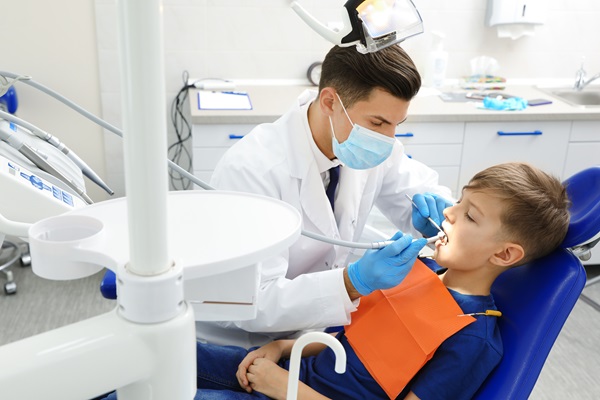Preventative Pediatric Dental Care Lake Worth, FL
Preventative pediatric dental care is care that helps children maintain good oral health. A healthy mouth and teeth are crucial parts of a child's overall health and happiness. Do not hesitate to get your child the care they deserve.
Invest in your child's current and future oral health with preventative pediatric dental care. Our team at Fara Bender DMD PA can help. Call us at (561) 763-9218 to learn more about our services or schedule an appointment.
The Importance of Preventative Pediatric Dental Care
Preventative care is a key component of oral health for all ages, especially for children. This type of dental care helps identify problems early on in a child's life before becoming more severe and costly. If left untreated even in the earliest stages of life, dental issues can have serious implications for a child's long-term health and well-being.
Pediatric dentists can also promote good oral hygiene habits early on in life, such as brushing twice and flossing at least once a day. This education and care can lower a child's risk of developing tooth decay, gum disease, and more serious dental problems. Taking care of teeth starts early in childhood and extends throughout life.
“This type of dental care helps identify problems early on in a child’s life before they become more severe and costly.”
When to Visit a Pediatric Dentist
According to the American Academy of Pediatric Dentistry, parents should take their children to the dentist when their first tooth appears or by their first birthday, whichever comes first. A child's first tooth typically comes in around six months of age. Although this may seem like a young age for a child to have their first dental visit, it is necessary to prevent dental problems.
The earlier children begin dental treatment, the better the care for their primary teeth will be. Although primary teeth eventually fall out, they play many essential roles and must remain healthy to carry out those functions. Visiting a pediatric dentist at an early age can also help children feel more comfortable and less likely to develop major dental anxiety.
“According to the American Academy of Pediatric Dentistry, parents should take their children to the dentist when their first tooth appears or by their first birthday, whichever comes first.”
Routine Vs. Deep Cleaning
Routine cleaning is a professional cleaning that children receive during a regular six-month check-up. It removes the buildup of bacteria and tartar accumulating between the teeth and gums to maintain healthy gums. These cleanings are a crucial part of preventing gum disease and even treating very mild forms of gingivitis. With proper brushing, flossing, and routine cleanings, children can keep bacteria to a minimum and maintain gum health.
If a child has mild to moderate gum disease, a deep cleaning may be necessary to eliminate bacteria and tartar buildup below the gumline. Gum disease can cause pockets in the gums to develop and become filled with bacteria and tartar. Without removal, it can lead to various oral health complications, such as periodontal disease and even eventual tooth loss. Deep cleaning involves scaling to remove plaque and tartar from above and below the gum line and root planing to smooth the teeth roots to help gums reattach to teeth.
“If a child has mild to moderate gum disease, a deep cleaning may be necessary to eliminate bacteria and tartar buildup below the gumline.”
Check out what others are saying about our dental services on Yelp: Preventative Pediatric Dental Care in Lake Worth, FL
Healthy Lifestyle Choices
Children need strong and healthy teeth to chew their food, speak, and have a healthy and attractive smile. A good diet is essential for a child's growth and development and plays a key role in overall dental health. Consuming too many carbohydrates, sugar, and starches can cause tooth decay . Parents should keep careful watch over their children's diets to help keep their teeth free from decay and other dental problems.
Good nutrition involves all the food groups and controlled amounts of sugar and carbohydrates. Parents should read food labels and choose foods and beverages that are low in added sugars. Nutrients, including calcium, potassium, omega-3's, and vitamins D, K, A, and C, all play a significant role in mouth health. Incorporating foods such as dairy products, fruits, leafy greens, nuts, and salmon is beneficial to oral and overall health. Our team can provide additional counseling and tips to parents to help their children maintain oral health.
“A good diet is essential for a child’s growth and development and plays a key role in overall dental health.”
Questions Answered on This Page
Q. What is the importance of preventative pediatric dental care?
Q. When should parents take their child to the dentist?
Q. What is the difference between routine and deep cleaning?
Q. What foods should children eat to promote good oral health?
Q. What are some preventative dental treatments for children?
People Also Ask
Q. When are space maintainers needed?
Q. How can I help my child take care of their teeth at home?
Q. What are some signs and symptoms of childhood dental problems?
Preventative Dental Treatments
Preventative dentistry services may include fluoride treatments, dental sealants, and mouthguards. Fluoride treatments help build strong teeth and are especially helpful for children who have a high risk of developing cavities. They support healthy tooth enamel and fight the bacteria that harm teeth and gums. Dental sealants are thin, plastic coatings that adhere to the molars' chewing surfaces to protect teeth from cavity-causing bacteria and debris. According to the American Dental Association, dental sealants can reduce the risk of decay by nearly 80% in molars.
Mouthguards can help protect the teeth of children who play sports or grind their teeth. These protective devices are especially important for children who play contact sports such as football, boxing, soccer, ice hockey, basketball, lacrosse, and field hockey. However, even noncontact sports and other recreational activities can injure mouths. Children who grind their teeth at night may also need a nightguard to prevent tooth damage while sleeping.
“According to the American Dental Association, dental sealants can reduce the risk of decay by nearly 80% in molars.”
Frequently Asked Questions
Q. Why are primary teeth important for children?
A. Primary teeth are extremely important and play many different roles in children's health and development. They help children eat, develop proper speech, and hold jaw space for the eruption and proper alignment of permanent teeth. The premature loss of baby teeth can affect a child's oral health.
Q. Why is daily flossing important?
A. Flossing every day is an important part of every person's oral hygiene routine, especially for children. This hygiene practice cleans debris and plaque from the tight spaces between the teeth. Our team can guide children on how to floss properly to get the most benefit.
Q. What happens during my child's first dental visit?
A. A child's first dental visit is usually short and primarily helps the child get used to the dentist. We will check the child's teeth for decay during the exam and look for potential problems with their bite, gums, jaw, and oral tissues. We will also clean their teeth, assess the need for fluoride, and educate parents about oral health care basics for children.
Q. How are dental sealants applied?
A. The process of applying sealants is quick and non-invasive. We will clean and dry the tooth before placing an acidic gel to roughen the tooth surface. After a few seconds, we will remove the gel and dry the tooth before applying the sealant to the grooves of the teeth. Then a special blue light hardens the sealant.
Q. How often should children receive fluoride treatments?
A. Children should receive in-office fluoride treatment every three, six, or 12 months depending on their dental health. Patients who are at risk of developing dental cavities may receive more frequent treatments. Our team can provide parents with information about their child's recommended treatment frequency.
Quality Pediatric Dental Services Can Transform Smiles
By visiting us as soon as possible, our team can help get your child the professional treatment they need.
Definition of Pediatric Dental Terminology
Call Us Today
Preventative pediatric dental care helps children maintain good oral health throughout their lives. Our team at Fara Bender DMD PA can keep your child's smile happy and healthy. Call us today at 561-763-9218 to learn more about our services or schedule an appointment.
If you live in the Lake Worth area, call 561-763-9218 for an appointment in our Lake Worth office.
Helpful Related Links
- American Dental Association (ADA). Glossary of Dental Terms. 2021
About our business, license, and website security
- Fara Bender DMD PA was established in 2002.
- We accept the following payment methods: American Express, Cash, Check, Discover, MasterCard, and Visa
- We serve patients from the following counties: Palm Beach County
- We serve patients from the following cities: Lake Worth, Royal Palm Beach, Lake Worth, Boynton Beach, Wellington, and Palm Springs
- FL (License #DN15072). View License Information and Specifics
- National Provider Identifier Database (1215034962). View NPI Registry Information
- Norton Safe Web. View Details
- Trend Micro Site Safety Center. View Details







